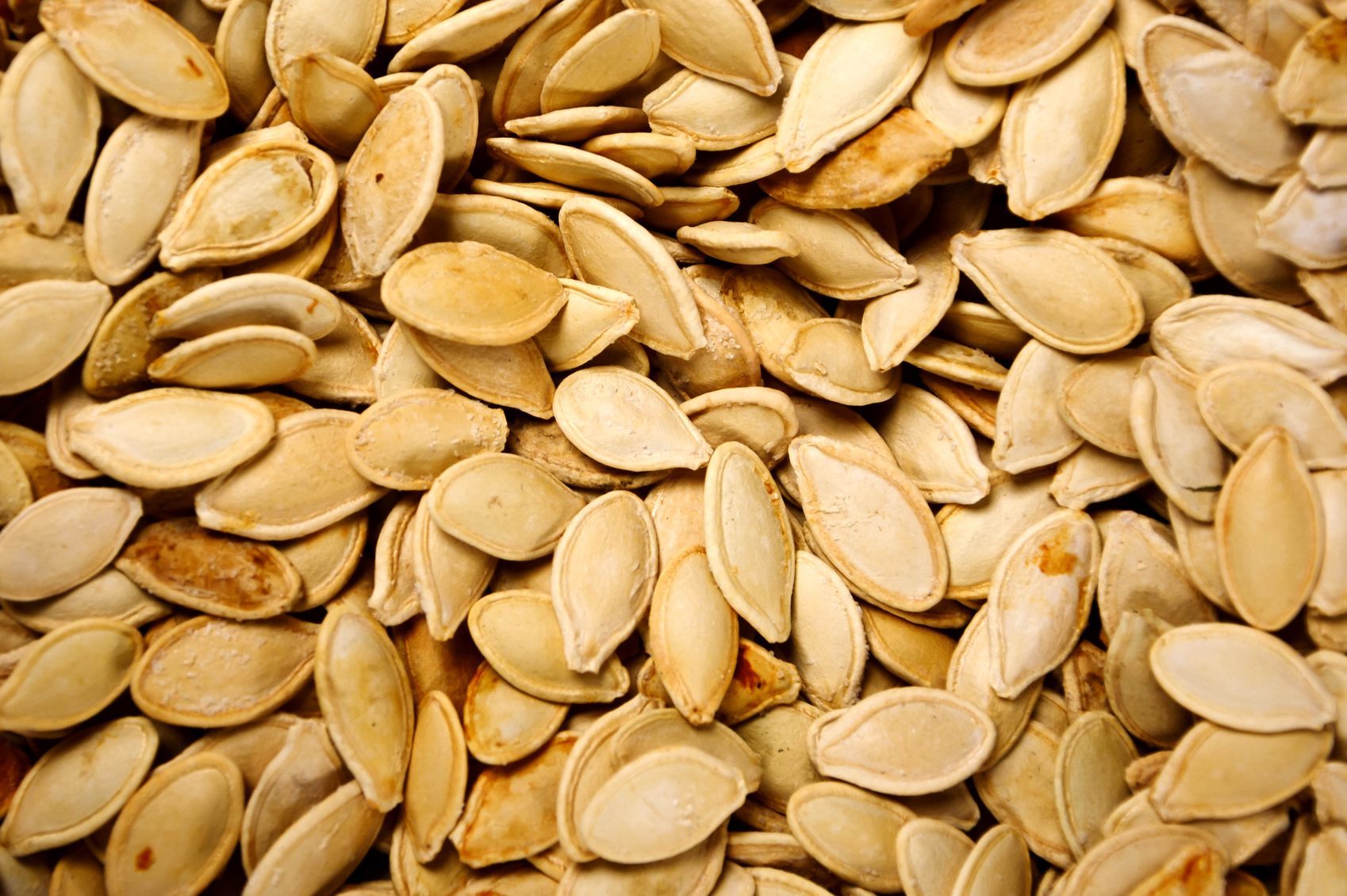Though relatively high in calories, a small handful of pumpkin seeds packs a big nutritional punch.

Are Pumpkin Seeds Good for You?

You’ve probably noticed pumpkin seeds on more and more restaurant dishes and in recipes of all kinds. That’s because pumpkin seeds (and pepitas and pumpkin seed oil) are having a moment. But have you stopped to wonder, are pumpkin seeds good for you? The answer is: Yes!
If you’re looking for a small but mighty nutritional powerhouse that’s easy to snack on or add to a variety of dishes, then look no further than the humble pumpkin seed. And if you’re only indulging in these tasty oval-shaped seeds during Halloween season, don’t forget that they’re available for year-round enjoyment at your local grocery store—all the yum, without having to stick your arm elbow-deep into a pumpkin.
Pumpkin Seed Nutrition Facts
One ounce of pumpkin seeds without shells, which is a standard serving size, yields the following nutritional benefits:
- Calories: 163
- Fat: 13.9 grams
- Protein: 8.45 grams
- Total Carbohydrates: 4.17 grams
- Fiber: 1.84 grams
- Potassium: 223 mg
- Folate: 16.2
- Phosphorous: 332 mg
- Magnesium: 156 mg
- Vitamin K: 223 mg
- Selenium: 2.66 µg
- Lutein and zeaxanthin: 8.5 µg
- Zinc: 2.17 mg
4 Health Benefits of Pumpkin Seeds
“Pumpkin seeds are high in healthy fats, protein, fiber, iron, vitamin E, zinc, manganese, magnesium and copper,” says registered dietitian Ana Reisdorf, MS, RD. “They are a great source of minerals in the diet.” And those key nutrients help make pumpkin seeds an essential food for protecting your health in the following ways:
Natural Sleep and Stress Aid
If you’re having trouble with sleep—from occasional sleepless nights to insomnia—a dose of pumpkin seeds may be the perfect bedtime snack. These little seeds are rich in magnesium and also contain a little tryptophan, a one-two punch for anyone needing more ZZZs. Magnesium has long been touted as a natural sleep aid because it helps increase relaxation and reduce stress.
Prostate Health and Fertility
As men age, their risk for prostate problems increases—but pumpkin seeds may help stave off common issues. Why? Because they are rich in zinc, a mineral prostates need adequate amounts of for optimal health. For instance, a 2011 study of prostate tissue showed that men with benign prostatic hyperplasia (BPH, aka prostate gland enlargement) had significantly less zinc levels. Another study shows that supplementing with pumpkin seed oil could be a clinically safe and effective alternative medicine treatment for BPH.
Additionally, the zinc in pumpkin seeds is associated with sperm count—one study shows that poor zinc nutrition may be a risk factor for low quality of sperm and infertility.
Reduced Breast Cancer Risk
Studies show that the lignans—compounds found in plants that mimic estrogen—in pumpkin seeds may help prevent or treat breast cancer. A large study of nearly 3,000 breast cancer patients and more than 5,000 women without the disease provided evidence that the consumption of phytoestrogen-rich pumpkin seeds is associated with reducing the risk of breast cancer after menopause.
Heart Health
Keep your ticker in tip-top shape with a daily dose of pumpkin seeds. It appears that heart-health benefits are derived from pumpkin seed oil’s power to increase your body’s ability to generate nitric oxide—this, in turn, helps expand blood vessels and reduce the risk of plaque growth in your arteries. And the high fiber content of pumpkin seeds may also help lower cholesterol levels, as studies show that individuals who consume high amounts of dietary fiber can significantly reduce their risk of cardiovascular disease.
Drawbacks of Eating Pumpkin Seeds
While you may be tempted to eat more than an ounce of pumpkin seeds hoping it will yield even more healthy results, it’s not advised. This is especially true if you choose salted options and need to watch your sodium intake. Plus, “eating a lot of pumpkin seeds may cause gas or bloating due to the fiber they contain, but this will depend on your personal sensitivity to it,” explains Reisdorf.
Finally, because pumpkin seeds are high in calories relative to their volume, it can be easy to overeat—so if you’re worried about weight, always measure your portions out with a kitchen scale instead of mindlessly snacking on these tiny treats.
How to Make Pumpkin Seeds and Use Them in Recipes
“I think packaged pumpkin seeds are much easier than scraping them out of a pumpkin,” says Reisdorf. But if you’re inclined to make them from scratch, follow this step-by-step guide to roasting pumpkin seeds. And feel free to jazz up your seeds with different flavors, such as mocha pumpkin seeds, sesame-garlic pumpkin seeds, spicy pumpkin seeds and even candied pumpkin seeds for a sweet version.
Besides snacking on a small handful, there are plenty of other ways to use pumpkin seeds in your meals. “Roasted or raw pumpkin seeds add a nice crunch to salads or soups,” says Reisdorf. “They can also be added to baked goods, chia pudding or even pie—anything that needs a bit of crunch with a dose of nutrition.”



















